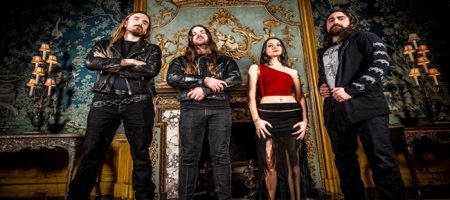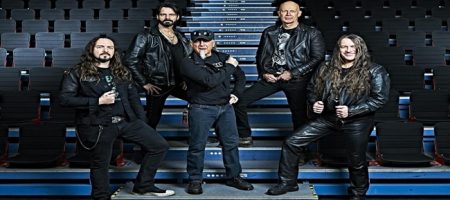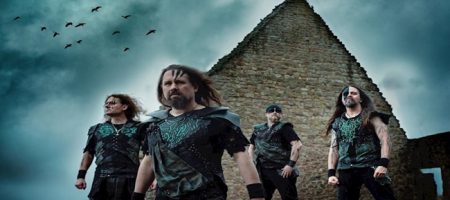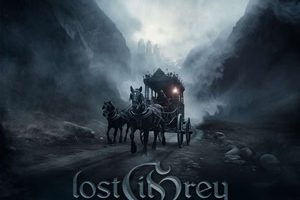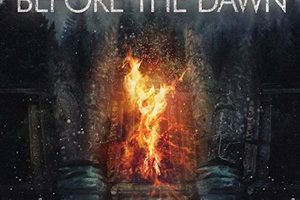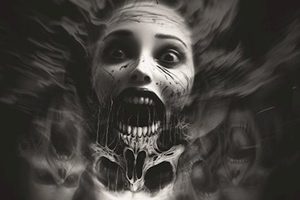Sirenia – Making Things Simple
Tuesday, 30th May 2023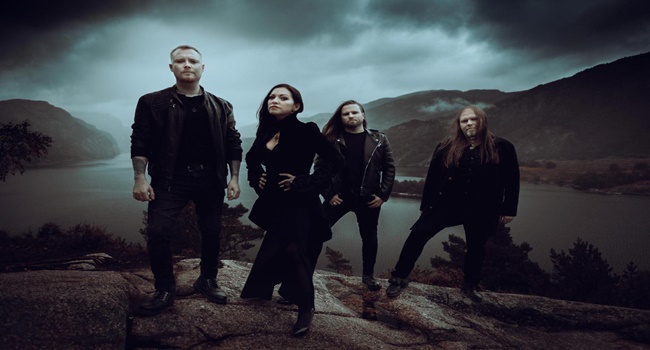
Releasing their eleventh studio album in 22 years, 1977 contains a lot of the trademark symphonic/gothic metal layers Sirenia has been well-known and revered for. At the same time, there’s a fresh synthwave/pop nuance that takes from an older 80’s perspective – something Morten Veland as the leader, main composer, and multi-instrumentalist for the group willingly adds to keep the material interesting. We reached out to Morten via Zoom to discuss the nostalgia factor that comes into play for the band, memories in France surrounding the video shoot for “Deadlight”, establishing a presence in North America with touring/festival appearances, challenges regarding responsibilities while keeping up with band activities, how fatherhood has changed his perspective in life, plus future plans for Sirenia and his solo project Mortemia.
Dead Rhetoric: 1977 is the eleventh studio album for Sirenia – where there is more of an exploration into synthwave and pop/rock influences from the 70’s, 80’s, and early 90’s into your established symphonic metal style. How did the songwriting for this set of material evolve given these new influences – and were there any surprises, obstacles, or challenges that came up during the recording / studio sessions this go around?
Morten Veland: The basis of the writing is quite similar with each album. I do a lot of composing with my guitar, set up the songs – at least the framework, sketches. After that is where it starts to get really interesting. I dive into the work with the keyboards and synthesizers, and it’s always been a very important part to Sirenia’s music – and still is. 80’s, early 90’s music, that represents my childhood with my teenage years. A lot of nostalgia connected to me with this time period, all these sounds. I’ve always enjoyed implementing those kinds of sounds into Sirenia’s music as well. For me personally, it gives something nostalgic.
We keep some of the symphonic elements with us. In some songs there is more of that, in some songs less of it. We are trying once more to make a diverse album. Implement a little bit of everything and give the album it’s own personality in a way. Making things sound a little bit different than anything else we have put out in the past. At the same time also, not trying to step too far away from the main concept of the band. It still sounds very much like Sirenia.
The process was quite smooth I would say. A lot less chaotic than the previous album during lockdown and all that. We only had some issues – with the flights for Emmanuelle, and that was COVID-related as well. It was Emmanuelle that got COVID. It wasn’t flight restrictions that had happened on the previous album, where flights got cancelled. With this album, she got ill, caught COVID, and we had to postpone things. We rescheduled it and everything worked out. We came pretty close to the deadline of the delivery with the masters. We had a little more pressure and stress towards the final process of the album.
Dead Rhetoric: How did the cover choice of “Twist in My Sobriety” come about? We know you are a big fan of that style of music, do you always have in the back of your mind specific cover choices you want to try for the band?
Veland: Yes, as you mentioned I am a huge fan of the 80’s. A lot of pop music comes out of the 80’s as well, not just rock music. Even pop music back then had a lot of strong vocal melodies, with a melancholic vibe to it. A lot of minor based songs were coming out in the 80’s, and I really enjoyed that. It’s a natural combination in a way for Sirenia to do some cover songs from this era. We did this as the bonus track – with each album, it’s a good format to play around with and do some fun stuff.
Dead Rhetoric: This is the fourth album with Emmanuelle Zoldan on vocals. What do you enjoy most about her range, delivery, and approach for Sirenia – and what do you consider some of her highlight passages or songs for 1977?
Veland: Emmanuelle is an educated singer with lots of experience and a huge range. As a songwriter, I’m free to do whatever I like. I know when I present a song to her, I know she’s going to perform it flawlessly. I feel very lucky in that sense. She’s been working as a professional singer for decades. She’s an amazing jazz singer, pop music, and everything in between. There (are) no limits to what we can do – it’s pretty much up to ourselves where we want to go with every album. That’s a really strong asset for the band, having a singer like Emmanuelle.
I’m awfully bad at remembering song titles. With this album, there are a few songs in there where she uses more of her classical voice. For the most part, she’s singing modern style vocals, that’s been the standard for Sirenia throughout the years. I wanted to have variation. This is our eleventh album, there are many songs out there.
Dead Rhetoric: Tell us about the video shoot for “Deadlight” – was this an obvious single choice, and where do you see the importance of the visual medium in promotion these days for the band?
Veland: Yeah, it felt like an obvious choice with “Deadlight”. It has a catchy melody, not too complicated of a song, not too long. Like a typical single track. The video, it was shot in a studio in Paris – we also drove off to a different city in France. We went to a really nice castle, where we shot a bunch of the shots for the video as well. And Emmanuelle had an extra day to shoot, on a beach in Normandy. Drone shots, and beautiful pictures like that. It was done on three different locations; the director is a good friend of ours. I’ve worked with her before on Mortemia, my other solo project. Working with her is very nice, it felt like a bunch of friends getting together to shoot stuff. It was very relaxed, and a nice way of working.
It seems that videos are more and more important. Spotify and YouTube are the two biggest mediums for digital platforms, so it’s important for every band to have a good presence on both those platforms. With YouTube, you need a video for that. You will get a lot more attention with a good video. Lately with Facebook and social media, people are putting more videos there as well. It’s a part of the future, it seems.
Dead Rhetoric: How did the cover art concept come about for 1977? Where do you see the importance of strong imagery and covers for the band in the current musical landscape?
Veland: It came together like we always do. We work with a guy Gyula Havancsák from Hungary for five covers already. Usually, it starts with me having a basic idea of what I would want on the cover – some simple ideas, a sketch I present to him. And then he takes these ideas and builds with a lot of his ideas. We bounce things back and forth a little bit – he sends me some versions, I bring in some additional ideas, add comments. We work our way to the final result. I think he’s really good at portraying or putting ideas into life. He really has a great understanding of what we like and what we are aiming for so that’s become very smooth to make a cover together.
Dead Rhetoric: Is it a challenge to come up with good lyrical content without repeating yourselves this deep into your career?
Veland: Yes, I would say that is probably one of the more challenging things at this point. Now that we’ve written so many albums and released so many songs with lyrics over the years. About writing new material, the music seems to come very naturally. I use a tiny little percent of all the ideas that I’m writing. That doesn’t seem to be a problem. With the lyrics, it becomes harder and harder to find new subjects. Sometimes I don’t want new subjects either – it’s more important that the lyrics go hand in hand with the atmosphere of the song. Sometimes I could be writing about the same subject as I’ve done before, and then it keeps getting harder to avoid repeating yourselves with the lyrics. I put more focus on this to avoid that.
Dead Rhetoric: You’ve had the chance to play on the 70,000 Tons of Metal cruise as well as do a couple of North American tours during 2017-18 – how was the overall response to Sirenia, do you believe you’ve been able to establish a stronger following in these territories, and hopefully expand the interest in this style of metal?
Veland: Yeah, we were over there in 2017. It was our first time, and it was a great tour. We didn’t really know what to expect over there, and it had been so many years that we didn’t make it over. There were delays, it took so many times before we finally made it there. During those two tours, we did the 70,000 Tons of Metal two times, and we are working on trying to make it over maybe the beginning of next year. It’s one of the places where we haven’t toured that much, we want to tour more there to keep building our fanbase.
Dead Rhetoric: Now being in your mid-forties, how has your outlook changed regarding your approach as a musician compared to what you wanted to do and achieve in your twenties and thirties?
Veland: A whole lot more experienced now, and more laid back as well. The experience makes you more confident, you are not stressed out so much when things in the past were much more concerning. These days I feel more relaxed with things. Music has been such a big and important part of my life for so long now. If it sounds right, it’s right. It’s about trying to make it simple. In the past looking back at it, I think in retrospect I think we made things a lot more complicated than they really were. You look at things with different eyes as you get older. Whether it’s touring, recording, or writing, it seems to be more relaxed, and things come more naturally to me.
Dead Rhetoric: How did you handle your extended downtime away from music during the pandemic? Did you dive into any new hobbies, passions, or interests?
Veland: I think I just dove deeper into music. Started writing a lot more music than before. I had so much time on my hands. I revived my solo project Mortemia, doing collaborations with other artists. Writing more for Sirenia too. As all the touring was taken away from artists, I dedicated more of my time to composing and writing.
Dead Rhetoric: What do you consider some of the biggest challenges facing Sirenia at this point in your career?
Veland: Maybe, as we get older, everybody gets more responsibilities in terms of mortgage, family, that sort of stuff. It’s logistically harder or more complicated now to make all the touring work. Back in the day when we were kids, things were quite easy – you just booked a gig, and you were there. Everybody dropped everything to run off and do it. People have a lot more responsibilities now, and it seems harder now after COVID. People are in a bit of a financial crisis.
Dead Rhetoric: What is a pivotal or critical moment that helped shape your musical career the most when looking at your time as a musician?
Veland: With Tristania, when we got signed that was definitely the critical moment. Things got serious and moving forward. That was a critical point in my entire career. I went from being that guy who loved music and had music as my hobby to stepping into an artist world. It took me many years to become a real artist, but this is where it started for real. This is what we were going to do. We got even more dedicated, kept going at it harder than ever. No turning back at that point.
Dead Rhetoric: How has fatherhood changed your outlook on life? What do you hope to instill as far as values within your children that may be similar or differ from how you were raised?
Veland: Becoming a parent, you change a lot of your ways, how you think. You are not the main person in your own life, so to speak. Especially in the beginning when they are so small and dependent on you. You start looking at life with a whole new set of eyes. One of the goals I’ve said to myself with my kids is to give them the freedom to follow their dreams, and to choose their careers. I will be there to support them in their decisions. Try to support everything that they do. Of course, guide them if there are times when things get hard, or they need help. Hopefully my life experience can be of some use there.
Dead Rhetoric: What’s on the horizon for Sirenia or any other musical related activities for the next twelve months?
Veland: For Sirenia, at the moment we will promote the new album and start touring soon. We have four summer festivals coming up, we will start touring in September in Europe. We want to do a lot of touring for this album. A lot of the touring for the previous album was destroyed by COVID and the travel restrictions. We are really hungry to start playing more again. I’m very busy with Mortemia, doing a lot of collaborations with great singers in metal. It’s been a lot of fun. It’s cool to combine these projects with down time.











